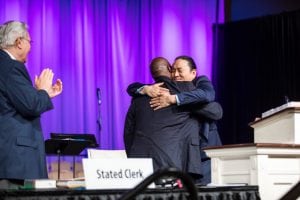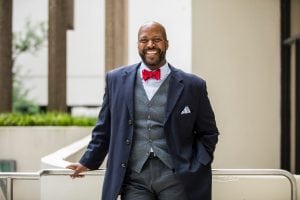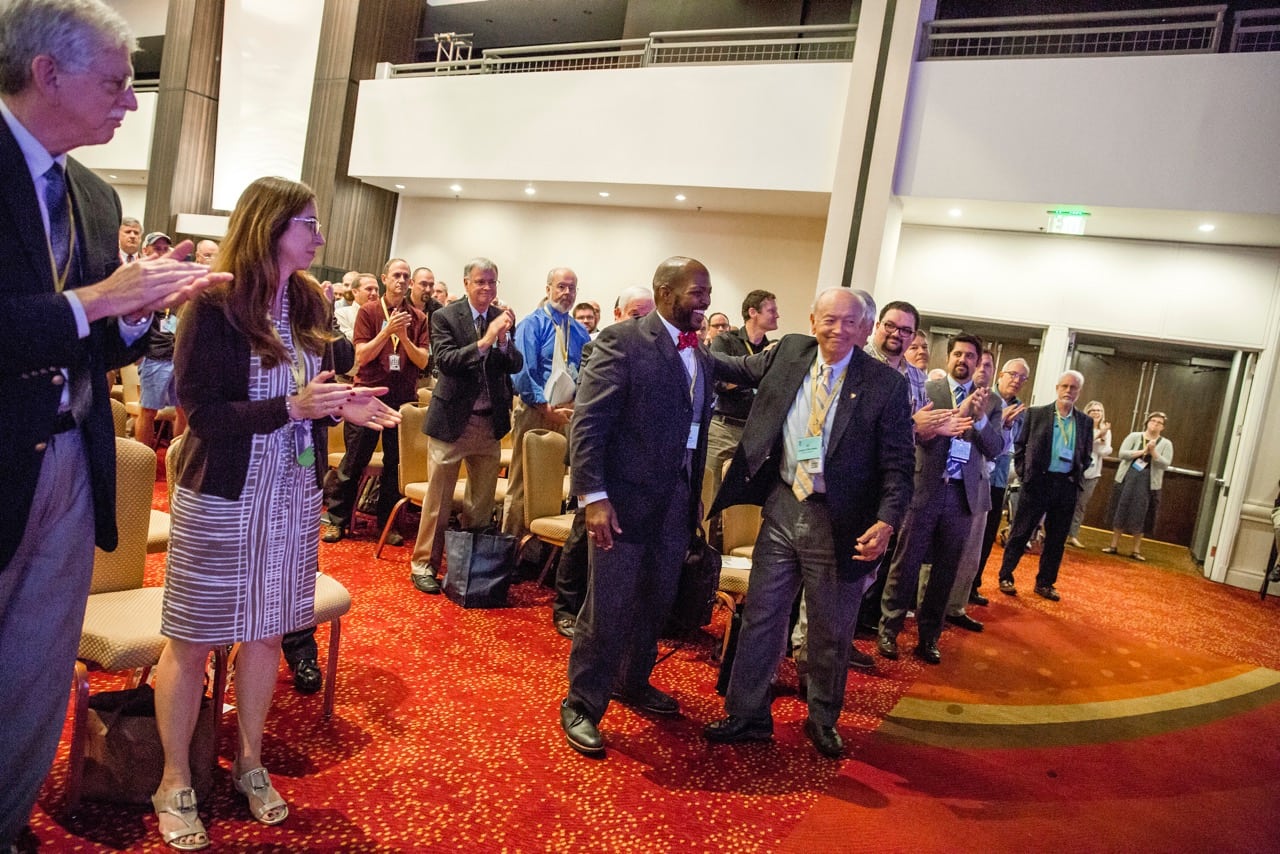The most powerful moment of the Presbyterian Church in America’s (PCA) 46th General Assembly in June 2018 was the unanimous election of Irwyn Ince as the assembly’s moderator. Ince is the first African American to hold the position, which is responsible for chairing the annual three-day meeting.
Ince walked to the podium to a standing ovation and cheers from more than 2,000 commissioners and spectators.
Waiting for Ince at the podium was outgoing moderator Alexander Jun, the PCA’s first Korean American moderator. After Jun handed Ince the gavel—the ceremonial transfer of leadership—the two shared a strong embrace.
As Ince turned to face the still-cheering Assembly, he flashed his broad smile and looked around. When he finally spoke, his first word was, “Wow.”
He didn’t stop there.

“Fathers and brothers, I am beyond humbled, grateful, privileged, overjoyed to serve as the first African American moderator of our General Assembly,” Ince said. “For most of my years in this church I’ve struggled to greet any court of our church with the greeting ‘Fathers and brothers.’ Brothers? Yes. But fathers? No. That began to change for me only in the past few years as I became aware of the reality that I have black fathers in American Presbyterianism.”
One was Matthew Anderson, who established Berean Presbyterian Church in Philadelphia in 1880. He faced not only the apathy of white Presbyterians toward the spiritual plight of blacks, but also the reticence of Philadelphia blacks toward the Presbyterian church—an institution they associated with aristocracy and perpetuating slavery.
Ince said he has likewise felt reticence and apathy in his work in the PCA.
“It has often felt to me that I was Presbyterian by accident,” he told the assembly. “I’ve experienced the reticence and the apathy Reverend Anderson spoke about as I have learned this denomination’s history and felt its aftermath—the fact that only 1 percent of our pastors are black.”
But studying the PCA’s history is also what gave Ince the hope and confidence to lead the denomination’s national gathering.
“There are no accidents, so I am delighted to serve as pastor in this branch of Zion, because it is where God has called me.”
Renewing Heart and Mind
Ince’s grandmother quit North Carolina during the Jim Crow era and resettled her family in New York City. Ince grew up in Brooklyn and attended Hanson Place Central United Methodist Church.
He earned his degree in electrical engineering from the City College of New York. While there, Ince abandoned his Christian faith as a vestige of white colonization and embraced the Black Power movement. He took classes in black studies and began identifying with Africa as his homeland while despising Western culture.
After college, Ince worked as an engineer for Motorola. At the invitation of his wife’s family, Ince and his wife, Kim, began attending New Bethel Baptist Church, a historic African American church in Washington, D.C. Though not interested in the Christian faith, the Inces enjoyed the opportunity to meet other blacks and other young couples.
“I was content to not be a Christian, but [God] wasn’t content for that to be my story,” Ince told TGC.

In 1995—shortly after attending Louis Farrakhan’s Million Man March—Ince and his wife decided to join New Bethel Baptist Church. Still, he wrestled with believing Jesus is the only way to salvation and felt unsure about making a profession of faith.
As Ince grew in his faith, he stumbled on a Bible program on a Christian radio station.
“My first thought was, Who’s this dry-sounding white guy?” Ince recalls. “But as I kept listening, I remember thinking, I’ve never heard the Bible taught with this kind of clarity. I want to listen to this guy again.”
The “dry-sounding guy” was R. C. Sproul. Ince became a regular listener to “Renewing Your Mind,” then subscribed to Tabletalk magazine and Ligonier Ministry’s Tape of the Month Club.
Five years later, Ince lost interest in the MBA that would have furthered his Motorola career, and he enrolled at Reformed Theological Seminary (RTS) in Washington, D.C. He graduated with his master’s degree in religion in 2006, following it 10 years later with a doctor of ministry degree from Covenant Theological Seminary.
Recovering a Lost Legacy
For years, Ince felt like an orphan in the PCA. One seminary professor asked the class why there were specific African American denominations for Methodists, Pentecostals, and Baptists, but not Presbyterians. The question felt more earnest than rhetorical, and Ince felt like it was directed at him.
He had no answer. It would be 10 years before he found one.
In 2017, PCA pastor and historian Sean Michael Lucas taught a General Assembly seminar titled “Lost Legacies: African American Fathers and Brothers in Presbyterian History.”

“Black Presbyterian fathers didn’t form a separate Presbyterian denomination because they instead chose to work inside the broken system for reconciliation,” Ince said. Black churches even came together to form all-black regional governing bodies (called presbyteries) within the Presbyterian church.
Lucas’s seminar introduced Ince to African American Presbyterians and prompted him to study Anderson more deeply. As he discovered his place in a line of faithful African American Presbyterians, Ince saw how he fit into a bigger story. He understood that he was not a Presbyterian by accident.
“Coming across [Anderson] made an immediate impact on me because this was related to me,” Ince told TGC. “He was making a defense of Presbyterianism as the right doctrine and apology for blacks in America. Coming across that really did spark a fire inside me that gave me more encouragement about being Presbyterian. There was a wealth of mentors I had no knowledge of.”
Covenantal Reconciliation
Ince, who directs the Grace D.C. Network’s newly formed Institute for Cross-Cultural Mission, draws encouragement from his fathers of color who overcame barriers of suspicion and apathy for the sake of the gospel.
“How beneficial will it be for church leaders in training to learn about those who, under very adverse conditions, promoted the cause of justice and did so unapologetically while knowing they were depending on the resources of the white Presbyterian brothers and sisters for funding?” Ince said. “They still spoke truth to power.”
Mentors like Anderson, Ince believes, will be key to the future of a denomination that hopes to be faithful to Scripture, true to the Reformed faith, and obedient to the Great Commission while representing the diversity of believers described in Revelation 7 in an increasingly hostile culture.
Ince ties those concerns together in his personal mission statement, written back in seminary: “The ministry of reconciliation as demonstrated in the local church by the gathering of people from diverse backgrounds, cultures, and ethnicities is the natural outworking of a rich covenantal theological commitment.”
Involved in Women’s Ministry? Add This to Your Discipleship Tool Kit.
 We need one another. Yet we don’t always know how to develop deep relationships to help us grow in the Christian life. Younger believers benefit from the guidance and wisdom of more mature saints as their faith deepens. But too often, potential mentors lack clarity and training on how to engage in discipling those they can influence.
We need one another. Yet we don’t always know how to develop deep relationships to help us grow in the Christian life. Younger believers benefit from the guidance and wisdom of more mature saints as their faith deepens. But too often, potential mentors lack clarity and training on how to engage in discipling those they can influence.
Whether you’re longing to find a spiritual mentor or hoping to serve as a guide for someone else, we have a FREE resource to encourage and equip you. In Growing Together: Taking Mentoring Beyond Small Talk and Prayer Requests, Melissa Kruger, TGC’s vice president of discipleship programming, offers encouraging lessons to guide conversations that promote spiritual growth in both the mentee and mentor.































